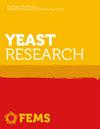麦芽糖积累诱导酿酒酵母细胞死亡
IF 2.7
4区 生物学
Q3 BIOTECHNOLOGY & APPLIED MICROBIOLOGY
引用次数: 0
摘要
木质纤维素的预处理会产生一种复杂的糖混合物,这种混合物有可能被工程酵母转化为生物乙醇和其他化学品。克服糖类之间吸收和代谢竞争的一种方法是使用能够高效转化单糖的专一菌株联合体。在这里,我们发现麦芽糖抑制了木糖发酵专性菌株 IMX730.1 的细胞生长,该菌株由于缺失了所有己糖激酶基因而无法利用葡萄糖。生长抑制不能归因于麦芽糖和木糖之间的吸收竞争。在缺乏麦芽糖酶的菌株(dMalX2)中,这种抑制作用会增强,而在删除所有麦芽糖转运体后,这种抑制作用会完全消失。在 dMalX2 菌株中,麦芽糖的高水平积累伴随着低渗样转录反应,而细胞在加入山梨醇等细胞外渗透溶质后可从麦芽糖诱导的细胞死亡中解救出来。这些数据表明,麦芽糖诱导的细胞死亡是由于高水平的麦芽糖摄取导致低张性应激条件造成的,可以通过麦芽糖转运体工程来防止。在开发稳定的微生物联合体以高效转化木质纤维素原料的过程中,应包括转运体工程。本文章由计算机程序翻译,如有差异,请以英文原文为准。
Maltose accumulation induced cell death in Saccharomyces cerevisiae
Pretreatment of lignocellulose yields a complex sugar mixture that potentially can be converted into bioethanol and other chemicals by engineered yeast. One approach to overcome competition between sugars for uptake and metabolism is the use of a consortium of specialist strains capable of efficient conversion of single sugars. Here we show that maltose inhibits cell growth of a xylose-fermenting specialist strain IMX730.1 that is unable to utilize glucose because of the deletion of all hexokinase genes. The growth inhibition cannot be attributed to a competition between maltose and xylose for uptake. The inhibition is enhanced in a strain lacking maltase enzymes (dMalX2) and completely eliminated when all maltose transporters are deleted. High-level accumulation of maltose in the dMalX2 strain is accompanied by a hypotonic-like transcriptional response, while cells are rescued from maltose-induced cell death by the inclusion of an extracellular osmolyte such as sorbitol. These data suggest that maltose-induced cell death is due to high levels of maltose uptake causing hypotonic-like stress conditions and can be prevented through engineering of the maltose transporters. Transporter engineering should be included in the development of stable microbial consortia for the efficient conversion of lignocellulosic feedstocks.
求助全文
通过发布文献求助,成功后即可免费获取论文全文。
去求助
来源期刊

FEMS yeast research
生物-生物工程与应用微生物
CiteScore
5.70
自引率
6.20%
发文量
54
审稿时长
1 months
期刊介绍:
FEMS Yeast Research offers efficient publication of high-quality original Research Articles, Mini-reviews, Letters to the Editor, Perspectives and Commentaries that express current opinions. The journal will select for publication only those manuscripts deemed to be of major relevance to the field and generally will not consider articles that are largely descriptive without insights on underlying mechanism or biology. Submissions on any yeast species are welcome provided they report results within the scope outlined below and are of significance to the yeast field.
 求助内容:
求助内容: 应助结果提醒方式:
应助结果提醒方式:


